- The
Many Faces of "Football" - Down
Under
-
|
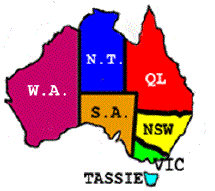
|
|
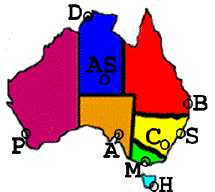
|
|
AUSTRALIA'S STATES & TERRITORIES
|
|
AUSTRALIA'S CITIES:
|
|
NSW - New South Wales
|
|
A- ADELAIDE (Capital of
South Australia)
|
|
N.T. - Northern Territory
|
|
AS- ALICE SPRINGS (Middle
of the Outback)
|
|
QL- Queensland
|
|
B- BRISBANE (nearest to
the Great Barrier Reef)
|
|
S.A. - South Australia
|
|
C- CANBERRA (The Capital -
It's in Australian Capital
Territory)
|
|
"TASSIE" - Tasmania
|
|
D- DARWIN (Most Aussies
have never been there)
|
|
VIC - Victoria
|
|
H- HOBART (Capital of
Tassie)
|
|
W.A. - Western Australia
|
|
M- MELBOURNE (2nd largest
city)
|
|
NOT SHOWN- Australian Capital
Territory
|
|
P- PERTH (and neighboring
city, Fremantle)
|
|
|
|
S- SYDNEY (largest
city)
|
-
By Ed Wyatt -
After several years writing and
appearing on "Almost Live," a popular Seattle comedy
show, and hosting a Portland newsmagazine show, my
son, Ed worked in Los Angeles for Fox Sports World,
concentrating on international soccer - I know, I know
- and Australian Rules Football. For the last year and
a half, he has been in Australia - he married an
Aussie, in case you wondered - working in TV covering
soccer, rugby, Australian Rules and the Olympics on
Australian TV. He has hosted the Australian broadcast
on the SBS network of the Super Bowl, along with
Aussie Darren Bennett of the San Diego Chargers. Don't
ask me how he gets by with the "Septic" accent
(meaning "Yank" - from "Septic Tank" = rhymes with
"Yank" - Aussies are big on rhyming slang). Ed has
coached high school basketball at Bellarmine Prep in
Tacoma, Washington and has helped me with football on
numerous occasions, and if I do say so he really knows
his sports. He is a graduate of Stanford - an English
major - and if he writes well, remember - I helped pay
for it.
-
- When I left the United States behind, I knew I was
giving up certain inalienable rights as promised me by
the Constitution. I also knew that I was giving up a
whole bunch of other things not as important legally,
but certainly more pleasurable. Things like Mexican
food, microbrews and those little fluffy sheets that
keep your laundry soft and make it smell good. And
football. Good, old-fashioned American football.
-
- They call it "gridiron" over here, because there
are so many different forms of football it gets
confusing otherwise. There's Australian Rules
Football, a frantic hybrid of soccer, football, and
basketball. Aussie Rules is called "Footy" in
Melbourne, but not in Sydney. Then there's Rugby
League, a 13-a-side game that has some similarities to
American football. It's called "Footy" in Sydney (but
not in Melbourne). It's also referred to simply as
"League." And then there's Rugby Union - called simply
"rugby" - a 15-a-side game that is played all over the
world, even in the U.S. There's also soccer which
here, same as in the US but not most of the rest of
the world, is called soccer. (Only the hardcore Greek,
Italian and Croatian immigrants call it
"football.")
-
- Gridiron has a toehold here, but that's about all.
It is played on what amounts to a recreational basis
by a handful of teams, but the hard fact is that
Australia's population is relatively small - about the
same as that of Texas - and spread over an area about
as large as Texas plus all the other 47 contiguous US
states, too. And after the more popular forms of
football - Australian Rules, Rugby Union and Rugby
League, not to mention soccer - have taken their share
of the athletes, the fans and the sponsors, there
really isn't a whole lot left over for American
football. Er, gridiron.
-
- The NFL is covered surprisingly well in the
newspapers here, and although I could get my
"gridiron" fix once a week on Fox cable at 4 in the
morning, it was usually the NFC and I can only take so
many Green Bay versus Detroit or Tampa Bay versus
Green Bay games. I needed something more, so I decided
to take a chance on these other brands of
football.
-
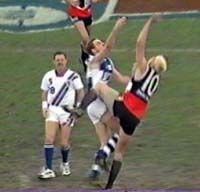 Australian
Rules Football Australian
Rules Football-
- You might know a little bit about this sport
because it was carried on ESPN in the early days, back
before Dan Patrick and Championship Week and those
clever Wieden & Kennedy ads. ESPN was in desperate
need of programming, so why not guys in short shorts
and sleeveless shirts running around beating the hell
out of each other? Even today in the states I run into
people who grew up with ESPN and can do Aussie Rules
Football umpire imitations.
-
- Aussie Rules is unique in that it's a game that
was developed in one Australian state - Victoria -
long before being pushed by its advocates into
neighboring states. Imagine a sport that developed in
Los Angeles long before it ever made it to San
Francisco. In fact, 10 of the Australian Football
League's 16 teams still call Melbourne home.
-
- In its simplest form, the purpose of the game is
to kick the ball through the other team's goal. The
game itself is played on a cricket "pitch" (field),
which is oval-shaped and huge - about 225 yards long
and 175 yards wide.
-
- There are four upright goal posts - no crossbars -
at each end of the field, and points are scored by
kicking the ball between the two middle posts (6
points) or between a middle post and the post to its
outside (1 point).
-
- The ball is advanced by kicking it, running with
it (provided the ball is dribbled or touched to the
ground every so often) or punching it with the hand (a
handpass).
-
- The fastest way to advance the ball a great
distance is by means of a long, spiraling punt called
a "torpedo" (does the name Darren Bennett of the San
Diego Chargers mean anything to you?). The ability to
field a punt - in a manner combining skills comparable
to a cross between basketball rebounding and
intercepting a pass at its highest point - is highly
prized, since a player catching a kick in the air is
awarded a free kick on goal for his efforts. What
makes the game especially rough is that players from
both teams normally compete to catch the punt.
-
- Aussie Rules cuts across a wide fabric of society,
more so than most American sports. There are luxury
boxes where the captains of industry eat lamb and sip
Chardonnay, and there are $14 (about $7 American)
general admission seats that fill up two hours before
game time and see more beer consumption there than
during Spring Break at Padre Island. There are also
more women than you'll see at an American sporting
event. And these women are into it, screaming things
like "Get rid of the ball, you bloody fool" or "aww,
stop your whinging (whining)."
-
- Weekly Aussie Rules matches draw the biggest
sports crowds in Australia. The average attendance is
somewhere near 40,000, which is pretty impressive
considering that Melbourne sometimes finds itself home
to four matches in one weekend. A "traditional" clash
between old rivals like Essendon and Collingwood can
draw up to 90,000 people at the venerable Melbourne
Cricket Ground (the "MCG" or just "The G"). A new
stadium, Colonial, has opened in Melbourne this
season. A 55,000 seat retractable roof facility,
Colonial is bringing an American sense of sports to
Australia, with PSL's, prebooked tickets and
scoreboard pyrotechnics. Australian
Football League
-
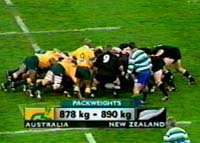 Rugby
(Or Rugby Union) Rugby
(Or Rugby Union) -
- If you have ever played or watched any rugby in
the United States, that's what this is: a 15-per-side
game of confusing masses called scrums, rucks, and
mauls, punctuated by the occasional wide-open
run.
-
- The purpose of the game, just like American
football, is to advance the ball across the other
team's goal line, scoring what is called a "try."
A "try" is the equivalent of a
touchdown, although the ball literally has to be
"touched down" to the ground after the player crosses
the goalline. A try is worth 5 points.
-
- After a try, the team is
also given a chance at a 2-point kicked conversion,
over a crossbar and between two uprights, similar to
an American football point-after. (The spot of the
kick, though, must be at some point along a line
extending directly back upfield from where the ball
was touched down, so if it was touched down a yard in
from the sideline, the kick must be attempted from a
spot back upfield a yard in from the sideline.) A
"penalty goal" - just like a field goal, but awarded
after infractions - is worth 3 points, as is a
drop-kick field goal, which can be kicked at any time
from any place on the field.
-
- The sport began in England at upper-crust schools,
including the school where it was invented and for
which it was named, Rugby. It was seen as a more
exciting and more gentlemanly alternative to soccer.
You may have heard the old saying "Soccer is a
gentleman's game played by hooligans, rugby is a
hooligan's game played by gentlemen." England itself
remains a rugby hotbed along with France, but the best
rugby in the world is played in the Southern
Hemisphere among fierce rivals Australia, New Zealand
and South Africa.
-
- Rugby in Australia has maintained its position as
a blueblood sport. It is played mainly in the private
schools, and unlike Aussie Rules, most of the
professional rugby union players have college degrees.
Sponsorship of rugby tends to be more upscale than
Aussie Rules.
-
- There is no professional league per se in
Australia. There is, instead, a competition called the
Super Twelve, which is made up of five teams from New
Zealand, four from South Africa and three from
Australia - the Queensland Reds, the New South Wales
Waratahs and the ACT (Australian Capital Territory)
Brumbies. Many Aussie players choose to play in
England or France rather than the Super Twelve, since
the European teams pay more.
-
- The biggest rugby union competition involves the
national team, the Wallabies. They compete against New
Zealand (the All Blacks) and South Africa (the
Springboks) in what's known as the Tri-Nations series.
The winner of this holds bragging rights as the best
national rugby side in the world. There is also a
trophy called the Bledisloe Cup, which is contested
between Australia and New Zealand as a sub-tournament
of the Tri-Nations. The Rugby World Cup is played
every four years, and Australia is the current
champion. "Rugby
Heaven" or Super
Twelve
-
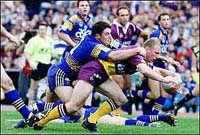 Rugby
League Rugby
League-
- Rugby League, or just plain "League," started as a
working man's sport played mainly in the north of
England. It was created as an alternative to the more
exclusive Rugby Union, whose upper class players were
mainly amateurs. English factory workers could not
afford to miss their jobs to play rugby, so a
breakaway competition was formed. When League moved to
Australia it maintained its working class
position.
-
- Compared with Rugby Union, League is much easier
for a novice to understand. It's a fairly simple game
of straightforward bashing and inside slashing, with
few of the really exciting outside runs seen in Rugby
Union.
-
- Rugby League has 13 players to a side and more
closely resembles American football than Rugby Union
in the sense that a team has the ball for the
equivalent of 6 downs (called "tackles"). After the
"fifth tackle" - or on "6th down" if you will - the
team with the ball is able to kick the ball to the
opponent to improve field position, much like a
punt.
-
- Just as with Rugby Union, the purpose is to score
a try. Unlike in Rugby, though, the try is worth only
four points. The point-after is worth two, and so is a
penalty kick, but the drop-kick
goal is worth only 1 point.
-
- Sydney is the spiritual home of League, accounting
for all but five of the 14 teams in the National Rugby
League (NRL). League is also big in Brisbane, but has
made little or no inroads into other capital cities
like Melbourne, Perth and Adelaide, where Aussie Rules
remains king.
-
- The NRL does not draw as well as the AFL, with
average attendance around 12,000. Part of this is
because of a huge rift created a few years ago by News
Limited (Rupert Murdoch's company) which started an
alternative competition called the Super League. It
drove salaries up, but caused havoc among the teams
and nearly wiped out the sport. As a consequence, the
NRL still struggles for credibility.
-
- One fascinating aspect of Rugby League is the
annual "State of Origin" series. Players who grew up
in the state of Queensland play those who grew up in
New South Wales in a mid-season "All Star" series. The
games attract crowds of 70,000 and are billed as
"State against State, Mate against Mate." National
Rugby League
- Rugby League
HQ
|


 Australian
Rules Football
Australian
Rules Football Rugby
(Or Rugby Union)
Rugby
(Or Rugby Union) Rugby
League